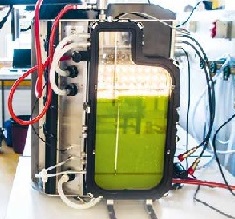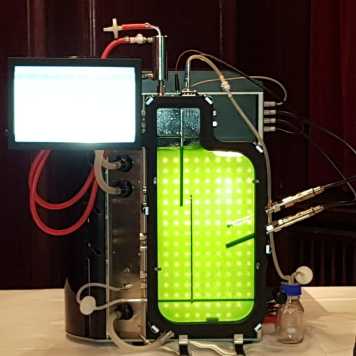Improving microalgae processing: New study from NewAlgae project
A new publication in Bioresource Technology from the WFSC member group of Prof. Alexander Mathys focuses on a comprehensive system characterization of an emerging nonthermal technique, pulse electric field, and its application in microalgae processing for consumption.

Algae is a promising protein source. However, the value chain of algae products is highly energy and cost intensive. As a result, only limited algae based food products are available on the market. The WFSC Research Programs project “New sustainable food formulations based on algae proteins” (NewAlgae) focuses on process innovation along the algae value chain, leading to product development.
A new study, published in Bioresource Technology, focuses on pulse electric field (PEF), an emerging nonthermal technique that uses short, high voltage pulses to process biomass. Such PEF processing can achieve gentle pasteurization of heat-sensitive liquids or efficient extraction of valuable compounds from microalgae, as well as other promising applications. To clearly eluciadate the many applications of PEF in microalgae processing, lead author Leandro Buchmann conducted a comprehensive PEF system analysis by combining multiphysics simulations with experimental data of Spirulina (A. platensis) suspensions. Experimental data was obtained using ultrasonic Doppler velocity (UVP) measurements and rheological validation.
The team of researchers from the WFSC member group of Prof. Alexander Mathys confirmed that UVP was an appropriate non-invasive method to validate simulations. Also, A. platensis suspensions follow a non-Newtonian, shear-thinning behavior. Overall, results helped to identify factors that can influence the PEF treatment, such as inlet velocity, medium viscosity, and treatment chambers. Understanding and controlling these factors is key to improve reproducibility in PEF research.
As PEF is not yet widely commercially used, this comprehensive system characterization facilitates research in the field of PEF processing for microalgae biorefinery approaches.
Read the entire article “Comprehensive pul sed electric field (PEF) system analysis for microalgaeProcessing” in Bioresource Technology external pageherecall_made

The paper is an output of the WFSC Research Program project "New sustainable food formulations based on algae proteins" (NewAlgae). For more information on the project, visit the project page

The WFSC supports a Flagship project focused on the topic of novel uses of alternative proteins for feed and food. The initiative is a collaboration of nine WFSC member groups, led by Prof. Alexander Mathys. Six projects will be underway this year, and efforts continue to secure funding to build the initiative.
